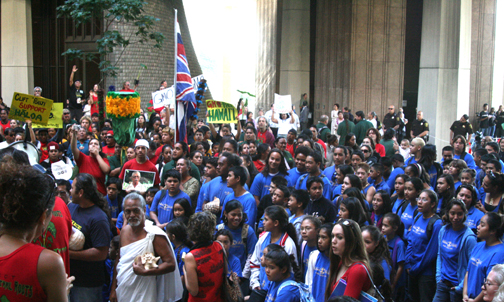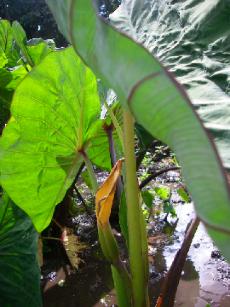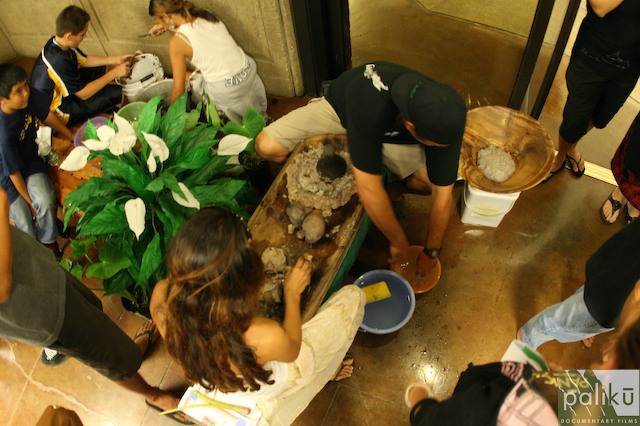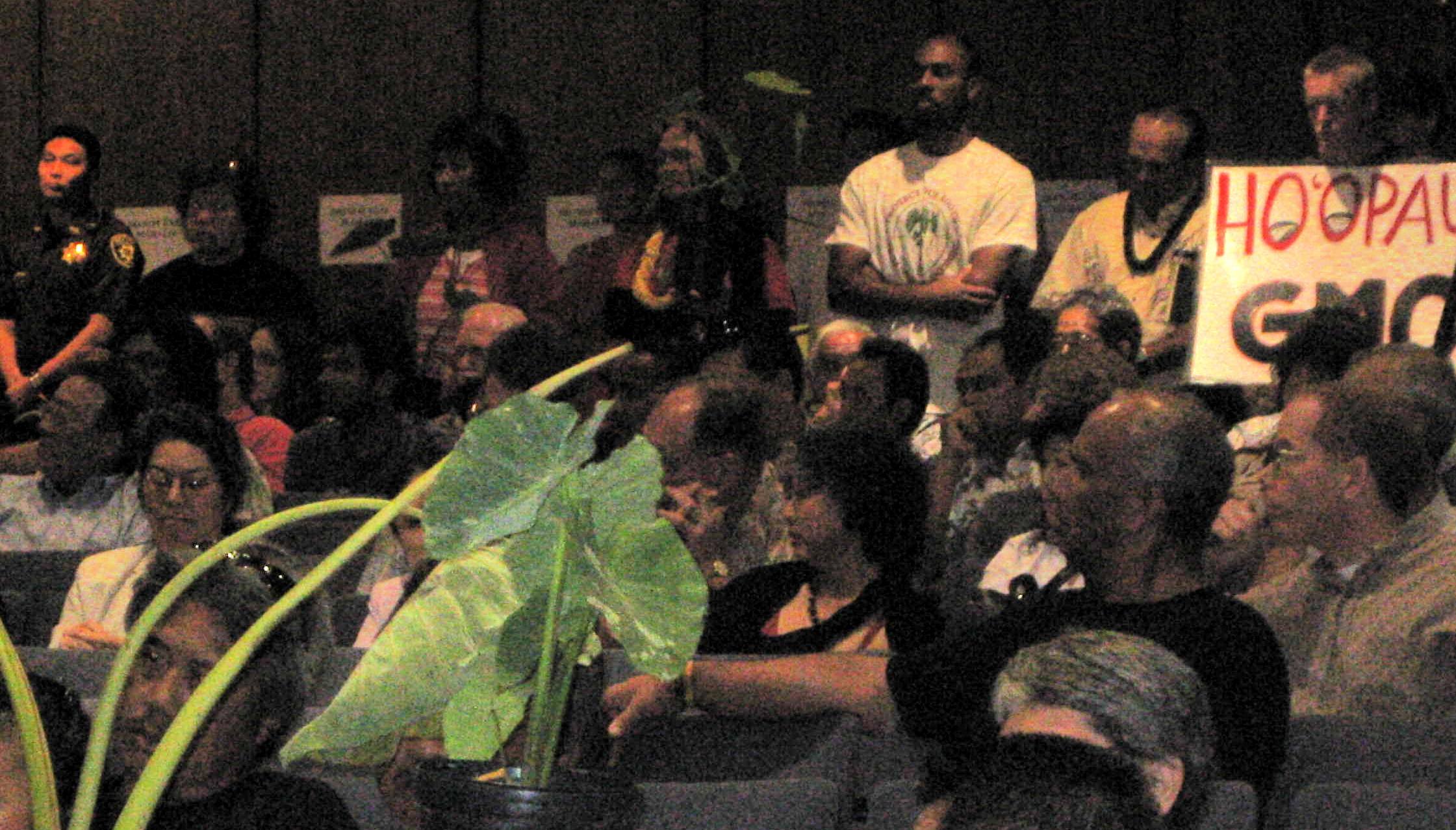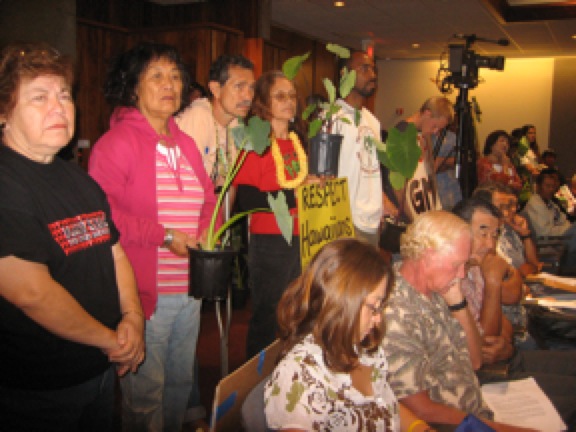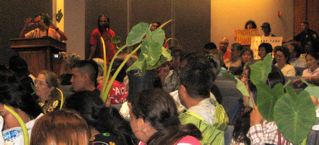Blog
News, updates, finds, stories, and tidbits from staff and community members at KAHEA. Got something to share? Email us at: kahea-alliance@hawaii.rr.com.
"This is not the end, this is just the beginning."
Yesterday, in the face of a historic outpouring of support for the genetic integrity of taro, the majority of Agriculture Committee members chose corporate biotech interests over those of Hawai’is’s traditional farmers.
Last month, well over 6,000 people from all corners of our community submitted testimony in support of a 10-year moratorium on the genetic modification of Hawaii’s most traditional and sacred food source, taro. Together, local taro farmers, scientists, professors, doctors, teachers, keiki, produce distributors, and Native Hawaiian cultural practitioners expressed concern about the potential environmental impacts of cross-contamination, unknown health consequences of genetic modification, and the cultural impacts of patenting. In the thousands, they expressed their opposition to the fundamental and irreversible modification of the genes of taro.
YET, in a 9-to-3 vote, the committee amended the bill to prohibit any future moratoriums on any GMO products, even at the county level. At the same time, they reduced the moratorium to 5 years and limited the protected taro plants to the Hawaiian varieties only. Under this amended bill, Haloa will not be protected. Now, other varieties of taro, like bun long, can still be genetically altered and cross-pollinate with the Hawaiian varieties, spreading the genetic alterations. More startling, this bill now also robs local communities of their ability to address GMO concerns in their own neighborhoods.
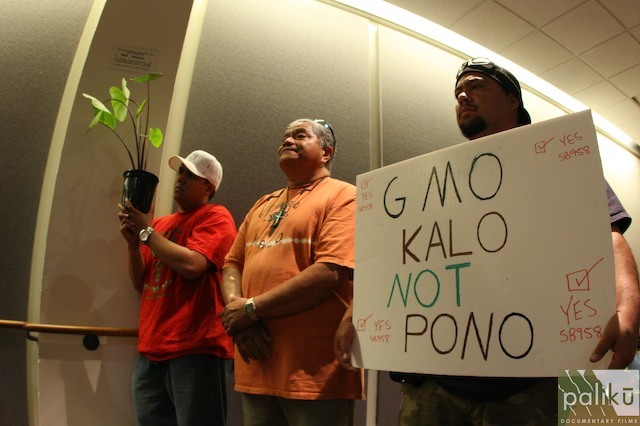
But we are not giving up.
“They should kill this bill and face the consequences and the wrath of the people. “It’s ridiculous. They don’t want to listen. But this is not the end. This is just the beginning.” – Jerry Konanui, Big Island Taro Farmer
The kuleana to protect elder brother, Haloa, is too important to turn our backs on! We stand with the taro farmers and the thousands of people who voiced uncompromised support for protecting Haloa. There are still four weeks left in the Legislative Session. And anything can happen. Learn more at the website and on the KAHEA blog.
In the meantime, every member of the Agriculture Committee is up for re-election this year. Prepare to plant your vote– Register to vote!
The momentum of this movement is stronger than ever. People all over the islands are now stepping up at the local level, starting campaigns of homegrown resolutions, speaking about this issue to every neighborhood board, at schools, registering voters, and continuing to take action, and to share.
This year could be revolutionary. Deepest mahalos to all who have shown their support and love, and who have taken action. This latest action is simply fuel for our imu! And we hungry!
Learn more:
Fate of Taro Bill SB958 to be Decided Thursday
We received word that the bill for a 10-year moratorium on GMO taro has been scheduled for decision-making! Thursday, April 3, 11AM in State Capitol Room 325.
Because we can’t say it any better than this:
I was working in my taro patch this morning in Waipi’o Valley, clearing my head, listening to the wind and the water, and I thought of the profound question you posed to me at yesterday’s hearing. Who own’s the taro? Awesome question, I must admit it startled me for a second, because in its simplicity it really speaks to the core of the whole issue of genetic engineering of kalo. “Who owns the taro”, you ask? Ke Akua owns the taro!
Kalo is a gift that has been passed down to us from our ancestors, generation to generation, for thousands of years. We are merely the current caretakers. I get paid for my hard work and to cover the expenses of producing poi, but the kalo–Haloa– does not belong to me. U.S. patenting laws state that if you are able to genetically manipulate one of God’s creations, you now own the creation. My spiritual beliefs have a hard time comprehending this.
Indigenous people around the world are struggling with this same issue–the Ojibwe protecting the wild rice, the Pueblo protecting the corn, the Inca protecting the potato. They all share the same ancestral ties and values to their life-giving crops as Hawaiians do with kalo. We all share the same disbelief at the utter disrespect for our culture, our heritage, our ancestors.
The huge outpouring of support for SB958 that was represented by the more 6000 written testimonies presented to the Ag Committee yesterday is just the tip of the iceberg. I keep hearing that we need to get the input of the Hawaiian community on this issue. Read those testimonies–they come from the heart, they come from the Hawaiian community. This passionate support for the protection of Haloa will never go away because this is our identity, this is ohana.
Hawaiians are standing up proud and strong, reconnecting to our culture, speaking our native tongue, proud of our past, confident of our future. We are honoring our kupuna, teaching our children, understanding our identity. In an effort to move forward in a positive direction, people are going back to their roots, only to find that our very roots are now threatened. I heard people yesterday who oppose SB958 say that they respect the culture, they understand… but. If they truly respected, if they truly understood, we would not be having a hearing. They would leave Haloa alone.
This is not an issue about science, academic freedom, economic investment, or the price of poi on the grocery shelf. As the language of SB958 states, this is an issue about respecting the cultural integrity of that which is vital to the identity of Hawai’i. In your powerful position as an elected decision maker, you have the ability to help heal a wound that has festered in Hawai’i for the last 115 years. In my humble opinion, in the interest of what is best for the future of Hawai’i, it is your kuleana to participate in this healing process. Please malama Haloa, please support SB958.
- Me ke aloha, Jim Cain, Farmer, Waipi’o Valley
You, too, can support and malama Haloa. Today, HALOA NEEDS YOUR VOICE.
Please take a few minutes to call these seven representatives on the Agriculture Committee and strongly urge them to pass SB958 without any amendments. The entire agriculture committee is up for re-election this year and many of their opponents are in vocal support of SB958!
Clift Tsuji HAWAII – SOUTH HILO TO KURTISTOWN
586-8480; fax 586-8484; From the Big Island, toll free 974-4000 + 68480 reptsuji@Capitol.hawaii.gov
Jerry L. Chang HAWAII – KEAUKAHA TO SOUTH HILO
586-6120; fax 586-6121; From Big Island, toll free 974-4000 + 66120 repchang@Capitol.hawaii.gov
Glenn Wakai OAHU – MOANALUA TO SALT LAKE
586-6220; fax 586-6221 repwakai@Capitol.hawaii.gov
Ryan I. Yamane OAHU – WAIPAHU/MILILANI
586-6150; fax 586-6151 repyamane@Capitol.hawaii.gov
Kyle T. Yamashita MAUI – PUKALANI TO ULUPALAKUA (UPCOUNTRY)
586-6330; fax 586-6331; From Maui, toll free 984-2400 + 66330 repyamashita@Capitol.hawaii.gov
Colleen Rose Meyer OAHU – KANEOHE TO LAIE
586-8540; fax 586-8544 repmeyer@Capitol.hawaii.gov
Joey Manahan OAHU – SAND ISLAND, MOKUEA, KALIHI KAI, KAPALAMA
586-6010; fax 586-6011 repmanahan@Capitol.hawaii.gov
The five representatives below have expressed support of SB958- it is important to call them ONCE to mahalo their wisdom and encourage their continued support of SB958- with NO amendments!
Tom Brower OAHU – WAIKIKI/ALA MOANA 586-8520; fax 586-8524 repbrower@Capitol.hawaii.gov
Lyla B. Berg OAHU – KAHALA TO HAHAIONE
586-6510; fax 586-6511repberg@Capitol.hawaii.gov
Faye P. Hanohano HAWAII – PUNA/PAHOA
586-6530; fax 586-6531; From the Big Island, toll free 974-4000 + 66530 rephanohano@Capitol.hawaii.gov
Robert N. Herkes HAWAII – PUNA TO KONA
586-8400; fax 586-8404; From the Big Island, toll free 974-4000 + 68400 repherkes@Capitol.hawaii.gov
Corinne W.L. Ching OAHU – NUUANU/ALEWA HEIGHTS
586-9415; fax 586-9421 repching@Capitol.hawaii.gov
See the Historic Movement to Save Haloa
A hearing was held March 19, 2008 to protect Hawai’i's ancestor and native crop – taro – from genetic modification and patenting. 6,000 people submitted written testimony in support. 8 hours of verbal testimony were given.
Now, the legislators need to pass this bill. Help them make the right decision. Click here to get involved.
Images from the hearing on SB 958:
http://maoliworld.ning.com/profile/Naalehu (click here to see more of Na’alehu’s pics)

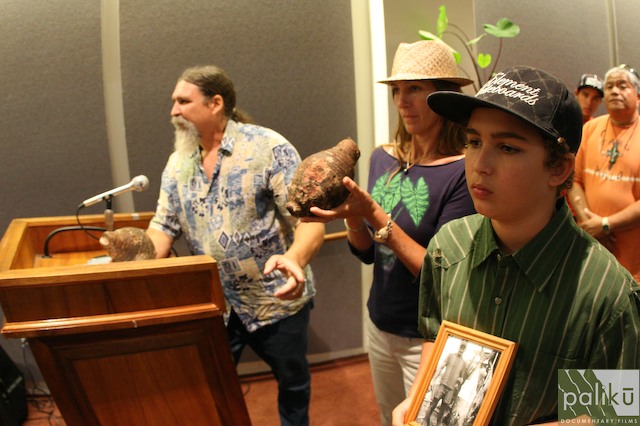
from KAHEA:
6,000 & growing...
from Marti:
Here is a letter that was published today in the Honolulu Advertiser (one of the few so far):
GENETIC MODIFICATION
CHANGING KALO ERODES HAWAIIANS’ LIFELINE
My mother used to serenade me with songs about exotic places. Travelogues of oceans, forests and island sweethearts. This is how she passed on knowledge. Songs reflecting simpler times and storytellers of the past. Our people were more disconnected than ever. Being Hawaiian was not popular. So to sing her aloha was her moment of self determination.
Her spiritual integrity impressed upon me indigenous ways of knowing. “Leave that popolo berry! It wants to grow there.”
If someone was to have told her she could no longer share limu among her classmates without a permit she would have sighed, “That’s why we going die out.” But she would respectfully accept it. She felt people saw her particular relationship with the ‘aina as peculiar.
Replanting kalo is the living lifeline that holds the stories of our past. Changing the genetic makeup of kalo will erode that lifeline.
Hawaiians are now re-establishing their priorities in maoli culture. A moratorium on varieties of maoli kalo and introduced kalo as specified in SB 958 is needed for more reasons than just keeping steroid-like pumped up food off our tables.
It’s needed so we can pass on to our keiki more than just “stones.” We can pass on the story of Haloa.
-Meala Bishop
Waiahole kalo farmer, Kane’ohe
To submit testimony on the protection of taro, click here.
what needs to be changed
The KAHEA office has been abuzz all weekend–the fax machine on overdrive–as staff and volunteers plowed through the task of organizing and compiling thousands of letters of testimony in support of a 10-year moratorium on genetic modification of kalo (taro).
Mahalo to everyone who has lent their voice in support of Hawai`i’s traditional farmers! As Bryna likes to point out: “Without the right to protect our traditional food resources what will remain of our culture or our rights?”
From Bryna:
The shared kuleana to save kalo and traditional farming is not only historical or cultural–it is a political imperative for Hawaii’s survival on this rapidly changing planet.
Thousands of letters of personal testimony, expert opinions and petitions for protection speak to the importance of pure kalo and traditional farming techniques for Hawaii. This is a truly pono moment in the history of humanity- thousands and thousands of people of all backgrounds are joining together to protect a plant species from irreversible genetic modification- and honoring an ancient ancestor and endangered Hawaiian lifestyle.
The message from the people is simple and clear: Haloa is family, Kalo is life, being in the Lo`i is living! It is not appropriate, necessary nor acceptable to engineer kalo into a genetically modified organism. The observation of the kalo farmers is profound: the kalo plant is not what needs to be changed.
Ka Leo Covers Support for GMO Kalo Moratorium
From today’s Ka Leo:
“We would like a total ban, but that’s not being responsible. This is a cooling off period,” said Jerry Konanui, a Native Hawaiian kalo farmer whose family has grown the plant in the Puna district of Hawai‘i for the past eight generations.
“The message from the people is simple: Hāloa is family, kalo is life, being in the lo‘i is living,” said Bryna Storch of KAHEA, a Hawaiian cultural and environmental advocacy group that organized the testimonies in support of the measure. “It is not appropriate, necessary nor acceptable to engineer kalo into a genetically modified organism.”
Genetic engineering, the process of inserting genes from one species into another resulting in the creation of GMOs, has been conducted in Hawai‘i for over a decade. Statistically, over 2,000 field tests of genetically engineered crops have been coordinated in the islands thus far, making Hawai‘i the most genetically tested agricultural region in the world, according to Earthjustice, an environmental advocacy group.
See the full article.
Contemplating the Future of Hawaii Agriculture
At staff meeting yesterday, we threw out this idea: How amazing would it be if “grown in Hawaii” was known world-wide to mean “organic and GMO free”?
As the most remote archipelago in the world–we are at the crossroads of the future of agriculture. We can either choose to become a haven for pure, high-quality, high-value organic and GMO-free food, or an isolated testing ground for corporate biotech to try out their genetically modified pharmaceutical and mcfood crops. What’s it going to be?
To remain silent on this issue, is the same thing as choosing. Unless we raise our hand to say “NO”, the future for Hawaii IS unrestricted, unmitigated, unlimited biotech. From last year’s Star Bulletin:
Pineapple will give way to biotech seed crops in Kunia as Monsanto Co. expands its acreage in the state by purchasing lands once tended by Del Monte Fresh Produce Hawaii.
Monsanto has entered an agreement to acquire 2,300 acres of agriculture-zoned land from the James Campbell Co.
See full article at: http://starbulletin.com/2007/04/05/news/story02.html

